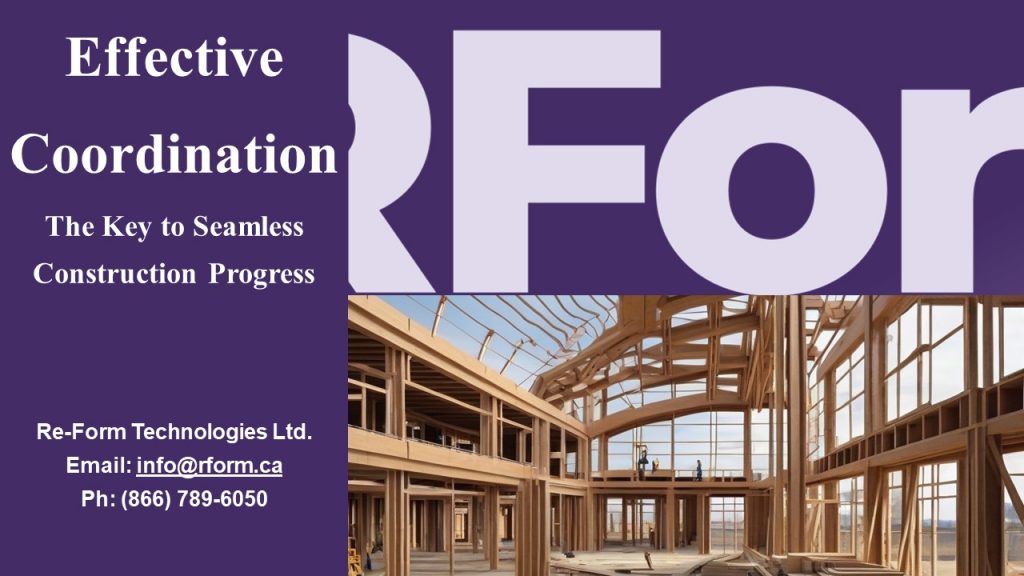
One of the most crucial elements to ensuring successful project execution is effective coordination. Without proper planning, communication, and collaboration between all relevant stakeholders, even the most well-designed projects can encounter delays, cost overruns, and quality issues. By understanding and implementing these principles, contract administrators can foster a harmonious work environment that maximizes efficiency and productivity.
Establishing clear project goals and objectives is essential in ensuring successful coordination and progress in construction projects. By clearly defining a project’s end goals, all stakeholders can align their efforts toward achieving those objectives. This clarity helps set realistic expectations, allocate resources effectively, and monitor progress throughout the project lifecycle.
Having well-defined goals also enables better decision-making processes and prioritization of tasks, leading to improved efficiency and productivity. Contract administrators can use these goals as benchmarks for measuring success and making adjustments as necessary to stay on track. Additionally, clear objectives provide a shared vision for all team members, enhancing collaboration and communication between different departments or contractors working on the construction project.
Effective coordination in construction projects relies on regular communication among team members, subcontractors, suppliers, clients, and other key players involved in the process. A comprehensive communication plan should include methods for sharing updates on project milestones, addressing potential issues or conflicts, and ensuring that everyone remains aligned with the overall project goals. Contract administrators can promote transparency and accountability while driving toward successful outcomes by fostering open dialogue and encouraging feedback from all parties involved throughout the construction process.
Incorporating technology tools such as RForm’s contract administration software creates collaboration platforms that can further streamline communication efforts within a construction project. Offering a centralized platform for managing Change Orders, RFIs (Requests for Information), Submittals, and other essential Contract administration documents enables real-time access to critical information such as budgets, design changes, and quality control measures across distributed teams working on different aspects of the project, by leveraging technology to enhance communication capabilities within a comprehensive plan framework encompassing both digital solutions & human interaction strategies. The outcomes are achieving optimal results efficiently, avoiding costly errors, maintaining high standards, and delivering projects successfully within schedule budget constraints while promoting positive business relationships is possible.
Effective coordination via a centralized platform facilitates smoother communication between team members, enhances overall productivity, and minimizes the risk of errors or misunderstandings. A centralized platform facilitates collaboration among different departments and individuals involved in a construction project. Organizations can ensure everyone is on the same page regarding timelines, deliverables, and expectations. This level of transparency promotes accountability and fosters a culture of teamwork that is crucial for achieving optimal results within budget constraints. Companies operating in the construction sector can optimize resource allocation and ensure that projects are completed on time without compromising quality standards.
Effective coordination in construction projects hinges on clearly defining roles and responsibilities for all stakeholders involved. Each team member, from contract administrators to subcontractors, must understand their specific duties and how they fit into the bigger picture of the project. Clearly outlining expectations and accountabilities can minimize confusion and misunderstandings, leading to smoother workflows and increased productivity.
When roles and responsibilities are well-defined, it becomes easier to identify potential bottlenecks or areas of improvement within a project. This clarity allows for better allocation of resources, timely decision-making, and efficient problem-solving when issues arise. Moreover, clear role definitions help establish accountability among team members, ensuring everyone is accountable for their contributions toward achieving project goals.
Regular progress meetings are vital to effective coordination in construction projects. These meetings allow all team members and stakeholders to come together, discuss current progress, address any concerns or issues, and align on plans. By establishing a consistent schedule for these meetings, contract administrators can ensure that everyone stays informed and engaged throughout the construction process. During these progress meetings, it is important to establish clear objectives and agendas to keep discussions focused and productive. This allows for efficient decision-making and problem-solving, ultimately leading to smoother project execution. Additionally, regular communication through progress meetings helps build trust among team members and fosters collaboration, creating a positive work environment where everyone feels valued and motivated to succeed.
Addressing issues and conflicts proactively in the construction industry is essential for seamless project progress. By proactively identifying potential roadblocks and addressing them before they escalate, contract administrators can prevent delays, cost overruns, and quality issues. This requires effective coordination between all stakeholders involved in the project, from designers and contractors to clients and regulatory bodies.
Key strategies for proactive conflict resolution include open communication channels, regular meetings to discuss progress and address concerns, clear delegation of responsibilities, and a commitment to resolving issues promptly. By establishing a collaborative work environment where everyone feels heard and valued, teams can work together towards common goals more efficiently.
Contract administrators must also be willing to adapt to changing circumstances quickly by having contingency plans for unforeseen events that may disrupt the project timeline. Proactive problem-solving prevents conflicts from escalating and fosters a culture of continuous improvement within the construction team. With effective coordination at its core, projects can run smoothly from start to finish with minimal disruptions or setbacks.
Celebrating successes and learning is essential to fostering a positive work culture within the construction industry. Recognizing and acknowledging achievements, whether small milestones or major accomplishments, can boost morale and motivation among team members. By taking the time to celebrate success, teams can reflect on their hard work and dedication, reinforcing a sense of pride in their achievements.
Furthermore, learning from mistakes and setbacks is equally important in ensuring continuous improvement in construction projects. By embracing a culture of openness and transparency, project teams can openly discuss what went wrong, identify areas for improvement, and implement strategies to prevent similar issues from arising in future projects. This process allows valuable lessons to be learned to enhance overall project performance and efficiency.
In conclusion, effective coordination relies on celebrating successes and embracing opportunities for learning throughout the construction process. By incorporating these principles into project management strategies, construction teams can navigate challenges with greater ease and achieve optimal results that meet client expectations while maintaining high-quality standards.

